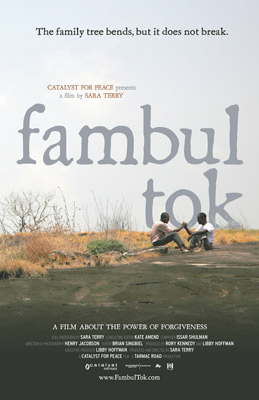
In recent years, the citizens of Sierra Leone have gathered in village compounds around bonfires, spoken openly of brutalities inflicted on them during their 11 years of civil war, and heard apologies by some of those who did the brutalizing.
To the amazement of growing numbers of observers from around the world, the result has been forgiveness and reconciliation and rebuilding, village by village, on a scale never before achieved.
These heartfelt conversations have been nurtured under a program called Fambul Tok (Krio for “family talk”), led by John Caulker, a human rights activist in Sierra Leone.
Fambul Tok began in the summer and fall of 2007, when John Caulker received the backing of Libby Hoffman and her Maine-based foundation Catalyst for Peace to develop a grassroots answer to the high-level, highly expensive UN-backed Truth and Reconciliation Commission in Sierra Leone.
Caulker, who had lobbied for the creation of the Truth and Reconciliation Commission, was deeply disappointed in how little it accomplished, after it spent more than $300 million on highly publicized trials of nine men. In contrast, Caulker wanted to help heal the lives of the average person in often-rural communities where neighbors looked suspiciously at neighbors, and even family members were divided by what some had done during wartime.
Hoffman caught the spirit of Caulker’s vision and worked with him – and with a few people at EMU’s Center for Justice and Peacebuilding, where she had attended SPI 1996 and returned for a course in 2000 – to design core elements, objectives and operating principles for Fambul Tok. Amy Potter Czajkowski, MA ’02, and Robert Roche, MA ’08, were program officers for Fambul Tok during its formative stages.
On June 11, 2013, Caulker was the Frontier Luncheon speaker at SPI. He treated his audience to an inspiring account of how a small ripple can, when patiently fanned, grow into a rising tide across the nation.
At SPI 2014, two rising leaders in Fambul Tok – women’s leader Michaela Ashwood and former pastor Emmanuel Mansaray – studied conflict analysis, psychosocial trauma, and organizational leadership. They are being prepared to step up as Caulker transitions from leading Fambul Tok in Sierra Leone to playing a wider peacebuilding role under the auspices of the African Union.
“From the very word go, we’ve made Fambul Tok a community-owned and community-led process,” said Ashwood, who has worked with Caulker for seven years. “We only support. They’ve heard about Fambul Tok on the radio, so they already know something about us. We may provide a bag of rice [for the community gathering], but they provide the goat or fish and fresh vegetables.”
Mansarary added, “We work at the level of the man in the village whose neighbor might have been the one who burned down his house, amputated his son and raped his wife.”
Everyone is longing for the opportunity to tell their stories, said Mansaray. “The victims have stories they want to tell, and so do the perpetrators,” who often talk of being drugged or otherwise forced to do horrible things when they ask for forgiveness.
Fambul Tok now has groups of women, called Peace Mothers (led by Ashwood), who are active in election campaigns and in schools, doing education and dousing sparks of conflicts before they become raging fires. This represents a change in Sierra Leone’s culture, where traditionally women had no voice.
Future plans include spreading peacebuilding principles through Sierra Leone’s schools to address violence that seems to be growing among the young – who lack a memory of the horrific civil war endured by their elders – and to lay the groundwork for enduring cooperation in future generations.
In 2013-14 Fambul Tok was operating in six out of the country’s 14 districts. In each of the six districts they have an office staffed by four, plus a security person. At its national headquarters there are 18 staffers. Catalyst for Peace remains the main funder for Fambul Tok, including funding Ashwood’s and Mansaray’s studies at SPI 2014.